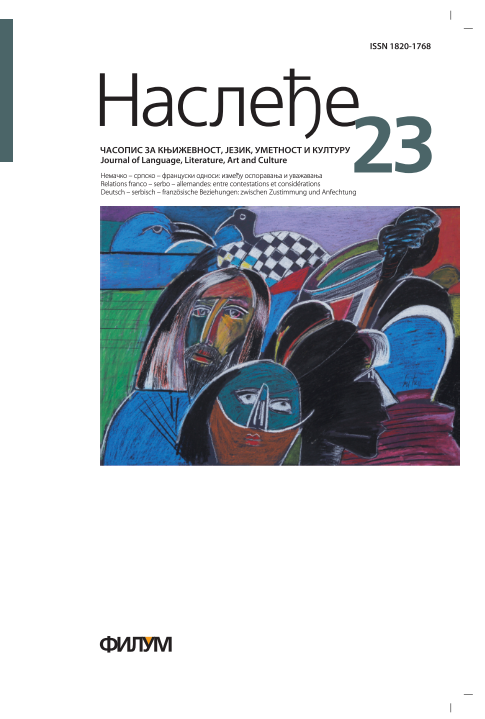THE CULTURE OF MASS PRODUCTION AS "THE PHILOSOPHY OF LIFE"
Keywords:
mass culture, education, consumption, mass media, United StatesAbstract
The widespread opinion that prevailed during the 1920‘s, was that countries like the United States entered the era of permanent abundance and mass production with improved construction industry repealed poverty and provides, for the first time in history, a high standard of living for everyone. Culture of mass consumption, which is then formed, can not be described the simple words. In fact, the effort to describe any period of history of American society, must include consideration of the ideas, values and tastes which at that time were particularly conspicuous and promoted. Illuminating its power and true nature can help to provide answers to one of the main issues of this artical and that is the way the American society in the mass culture is transmitted.
References
Алексић 2006: V. Aleksić, Rađanje ideologije potrošačkog društva u Sjedinjenim Američkim Državama 1920-ih godina, у: Megatrend revija, Međunarodni časopis za primenjenu ekonomiju, Vol.3, (1), Belgrade, 117-144.
Браун 2005: Elspeth H. Brown, Popular Culture and Democratic Politics, Canadian Review of American Studies/Revue canadienne d’études americaines, 35, no.3, 335-344.
Колинс 2005: W. J Collins, “Race, Labor Markets, and Social Disorder in Twentieth-Century America“, in Social Science History 29:2, 235–239.
Де Граф 1990: L. DeGraaf, Corporate Liberalism and Electric Power System Planning in the 1920s, The Business History Review, Vol. 64, No. 1, Government and Business, 1-31.
Џонсон 2003: P. Džonson, Istorija američkog naroda, Beograd, Knjiga-komerc.
Фром 1978: E. From, Bekstvo od slobode, Beograd: Nolit.
Гуд 1963: W. J. Good, “Industralization and Family Change“, in Industralisation and Society, Unesco, Monton, 237-259.
Хазлит 1990: T. W. Hazlett,The Rationality of U. S. Regulation of the Broadcast Spectrum, Journal of Law and Economics, Vol. 33, No. 1, 133-175.
Хосбаум 2002: E. Hobsbaum, Doba ekstrema, Kratka istorija dvadesetog veka 1914–1991, Beograd: Dereta.
Џексон 1994: L. Jackson, Fables of Abundance: A Cultural History of Advertising in America, Basic Books, New York: Basic Books.
Џонс, Хауард, Мамфорд 1954: Jons, Howard, Mumford, Književnost‘ i ekonomski poredak, u: Spasavanje američkog kapitalizma, Jedan liberalni ekonomski program, Kultura: Zagreb, 343-345.
Клајн 2001: M. Klein, Rainbow‘s End, The Crash of 1929, Oxford: Oxford University Press.
Кроен 2004: S. Kroen, A Political History of the Consumer, The Historical Journal, 47, 3, 709-736.
Кроес 2002: R. Kroes, “American Empire and Cultural Imperialism: A View from the Receiving End”, in Rethinking American History in a Global Age, (Edited by Thomas Bender), University of California Press, Los Angeles, Berkeley, London: 295-315.
Кивиг 2004: D. E Kyvig, Daily Life in the Unitetd States 1920 – 1940, How Americans Lived Throught the „Roaring Twenties“ and the Great Depression, Chicago: Ivan R. Dee.
Минх 1992: R. Münch, “Social Change in the United States: The System of Equality and Inequality” Social Change and Modernity, (Edited By Hans Haferkamp and Neil J. Smelser), University of California Press, Berkeley, Los Angeles, Oxford, 147-178.
Портер 2002: E. Porter, What Is This Thing Called Jazz? African American Musicians as Artists, Critics, and Activists, Berkeley, Universitiy of California Press.
Скот 1972: S. Scott, “Lessons from the History of American Broadcasting“, Science, New Series, Vol. 178, No. 4067, 1263-1265.
Слоат 2004: W. Sloat, 1929, America Before the Crash, New York: Cooper Square Press.
Соул 1989: G. H. Soule, Prosperity Decade: From Wor to Depression: 1917 – 1929, The
Economic History of the United States, No. 8, Columbia University Press, New York: 113-119.
Вомак 2005: J. Jr. Womack, “Doing Labor History: Feelings, Work, Material Power“, The Journal of The Historical Society, V3, 255-296.






